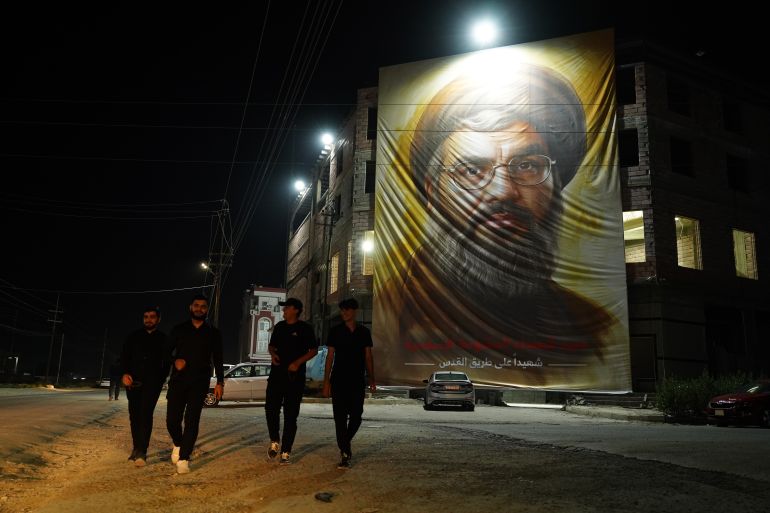Iraqis mourn Nasrallah, vow to ‘continue resisting Israel’
A fabric portrait of late Hezbollah leader Hussein Nasrallah, who was killed in Beirut in an Israeli strike on Friday, is seen on the facade of a four story building in the village of Khazna, east of Mosul [Al Jazeera]By Ismael AdnanPublished On 2 Oct 20242 Oct 2024
Since the beginning of Israel’s attack on Lebanon, and especially the Friday killing of Hezbollah leader Hassan Nasrallah in Beirut, the mood in Iraq has been one of anger and mourning.
30-year-old Imad Qusay Abbas, from the Nineveh Plain to the north-east of Mosul in northern Iraq, said he received the news of Nasrallah’s killing on his return from a solidarity vigil for the victims of Israeli aggression across the region organised by the Iran-backed Iraqi armed group, Kata’ib Sayyid al-Shuhada (KSS).
“We never imagined that we would return from the solidarity vigil and hear the news of the martyrdom of Nasrallah,” he told Al Jazeera. “He was martyred as we were carrying his pictures and chanting for Lebanon and Palestine. It was a real shock.”
After Hezbollah confirmed the killing of Nasrallah, hundreds of Iraqis once again took to the streets across many provinces, from Basra and Karbala to Baghdad and Mosul, to mourn him and stand in solidarity with millions of others suffering from Israeli attacks in Lebanon, Gaza and across the region.
Complete breakdown of the international order
In the capital, Baghdad, on Saturday protesters tried enter the Green Zone [a district in central Baghdad, which is the seat of the Iraqi government] and set the US embassy there on fire as they chanted slogans declaring the assassination of Nasrallah in Beirut represents a complete breakdown of the international order.
Almost everyone across Iraq’s crowded political and security spectrum also issued statements condemning Israel’s killing of Nasrallah and ongoing attacks on Lebanon.
Iraq’s Prime Minister Mohammed Shia al-Sudani condemned the attack as “shameful” and “a crime that shows the Zionist entity has crossed all the red lines”.
In a statement, Sudani called Nasrallah “a martyr on the path of the righteous”, and declared a three-day mourning period.
Sudani’s statement came shortly after influential Iraqi Shia Muslim leader Muqtada al-Sadr wrote on X: “Farewell to the companion of the path of resistance and defiance.”
Later, KSS Secretary-General Abu Alaa Al-Walae said, also in a post on X, that “Iraq, with its government, people and resistance, did not and will not allow the imposition of a siege on proud Lebanon”.
The highest Shia authority in the country, Sayyid Ali al-Sistani, meanwhile, urged citizens “to do what contributes to alleviating their suffering and securing the humanitarian needs [of the Lebanese people]“, after which donation collection operations were launched in various cities.
Nasrallah ‘in the consciousness of the nation’
In the village of Khazna, east of Mosul, Shias held a mourning council for the soul of the late Hezbollah leader. Mourners, who also revealed a fabric portrait of Nasrallah covering the entire facade of a four story building, said while Hezbollah leader’s body may have been gone, his thoughts and beliefs continue to guide his followers.
“Nasrallah entered history through its widest doors,” Sheikh Hassan Al-Shabaki, supervisor of the Sayyed Al-Shuhada Cultural Complex in the village, told Al Jazeera. “They thought they had gotten rid of him, but they have established his permanent presence in the consciousness of the nation.”
“Of course, it was a shock to hear the news of the martyrdom of the Sayyed, but we always say that the banner is handed down from one leader to another,” said 31-year-old Duraid Fadhel, also attending the ceremony. “Hezbollah will not be broken and will become stronger.”
At vigils and protests honouring Nasrallah, alongside anger towards Israel and determination to “continue the resistance” some concerns over the conflict’s expansion into Iraq were also voiced.
“The Zionist entity is exterminating the Palestinians and now it is exterminating the Lebanese, and Iraq’s turn is coming,” Imad told me. “We sense the coming danger.”
